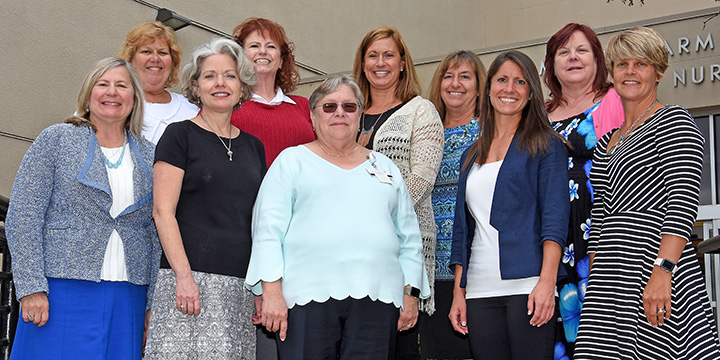If you’re already beginning to think further down the road in your upcoming career – perhaps aspiring to become a clinical nurse practitioner, administrator or educator, it’s never too early to start exploring. Over the next several issues, the Rapper will feature “Going to Graduate School,” stories and information to answer your questions or spark your thinking.
Jill Kilanowski, PhD, RN, APRN, CPNP, FAAN, associate dean for Graduate Nursing Programs at MCCN, says now is the time to begin planning for the future.
“I always encourage students who inquire about earning an advanced degree to begin by understanding where their passion is in nursing,” notes Dr. Kilanowski. “And, we generally encourage new nurses who hold a Bachelor of Science in Nursing (BSN) degree to work for one or two years to gain practical experience before they apply to the Graduate Program, as this experience gives them an understanding of the role of the registered nurse and knowledge gained helps in future classroom course assignments.”
Graduate Program at MCCN
Master of Science
MCCN’s fully accredited master’s degree program offers core classes online, with specialty track classes taught face-to-face or in a hybrid model. The Master of Science (MS) degree is available in four tracks:
- Adult-Gerontology Acute Care Nurse Practitioner (AGACNP)
- Family Nurse Practitioner (FNP)
- Nursing Administration
- Nursing Education - all online
Post-Master’s Certificate
In addition, professionals who already hold a master’s degree in Nursing may wish to take their careers to a higher level with a post-master’s graduate certificate in a focused field of study. MCCN offers certification through the same four track options.
Doctor of Nursing Practice
For those professionals who want to advance as innovative leaders in implementing evidence-based, cost-effective and collaborative healthcare solutions, while positively impacting outcomes for patient populations at the complex systems level, MCCN’s doctorate program is for them.
This month, Dr. Kilanowski discusses the process of discernment for becoming a Nurse Practitioner:
“I always begin the exploration process with a student by asking what kind of nursing work inspires them – I want them to consider if they are the type of person who gets a rush of adrenaline when they think about caring for trauma or critically ill patients, having to rely on quick thinking to know what to do next,” she says. For nurses who are interested in working with central lines, endotracheal tubes and high technology treatment in an acute care or hospital setting, they might consider the Adult-Gerontology Acute Care Nurse Practitioner (AGACNP) degree or certificate, according to Dr. Kilanowski.
“On the other hand, the Family Nurse Practitioner (FNP) program or certificate is for nurses who find they are more interested in providing primary care for a core of patients over a long period,” she says. These practitioners may care for whole families – from birth to death – possibly in their own private practice, a physician’s office or a clinic situation.
“I was proud and humbled to see firsthand – when my 94-year-old father fell and was hospitalized two weeks before his death in August – how the role of the nurse practitioner has emerged to be one of the most important members of the healthcare team,” she recalls. “He was professionally and compassionately cared for by NPs in trauma, neurology, palliative care and, finally hospice.”
“The fact is, I’m proud to be a certified pediatric nurse practitioner and, as an educator, really enjoy helping undergraduate students look ahead and professional nurses plan what’s next. My door is always open,” Dr. Kilanowski adds.
Next month: Want to be a Nursing administrator or Nursing educator?
Graduate faculty pictured above, from left to right: Jill Kilanowski, PhD, RN, APRN, CPNP, FAAN, Associate Dean of the Graduate Program; Corina Huston-Shaikh, PhD, RN, CFNP; Tracy Riley, PhD, RN, CNS, CNE; Jill Beavers-Kirby, DNP, MS, ACNP-BC; Beverly Gish, MS, FNP-BC, CNE; Jennifer Saffell, MSN, FNP-BC; Ann Waterman, PhD, RN; Christine Salem, MS, APN, FNP-BC; Therese Snively, PhD, RN; Sonya Saffell, MSN, FNP-BC.



